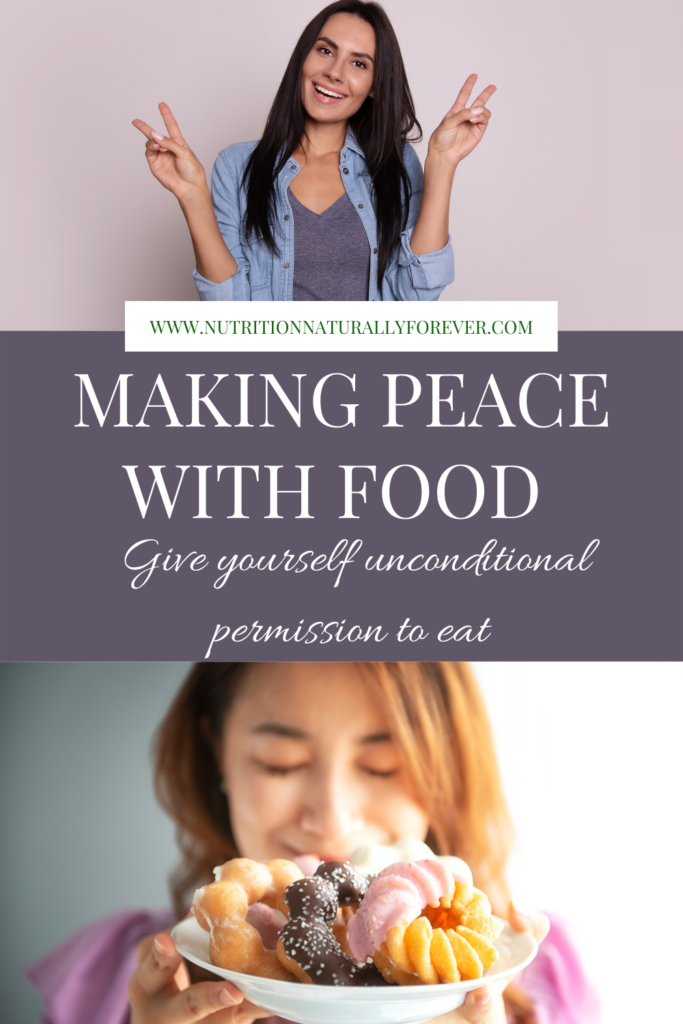
Making Peace with Food: A Guide to Hormone Harmony.
Why Does Food Feel Like a Battleground?
For many women, food often feels like a daily battle.
Whether it’s persuading children or grandchildren to try new foods or second-guessing your own choices, the stress and judgment surrounding eating can feel overwhelming.
Does your inner critic sound anything like this?
- Am I eating too much?
- Have I “earned” this meal? (with exercise or restriction)
- Is this the “right” amount of food?
- Are all carbs bad for me now?
- Why is it harder to maintain my weight even though I haven’t changed how I eat?
Here’s the truth: food doesn’t have to be a source of stress.
There’s a better way to approach it.
In this third post of my Intuitive Eating series, I’ll show you how it’s never too late to build a better relationship with food.
By doing so, you can create hormone harmony to support your menopause health and enjoy lifelong well-being.
Returning to Our Roots as Intuitive Eaters
We are all born with the innate ability to eat intuitively.
As babies, our bodies naturally signal when we’re hungry and when we’ve had enough.
Over time, however, societal pressures, cultural values, and diet culture overshadow this natural instinct, turning food into something to control rather than enjoy.
It’s time to make peace with food, reconnect with your body’s intuition, and rediscover the joy, satisfaction, and health that come from a positive relationship with eating.
In my last blog post, we explored the importance of honouring your hunger.
Hunger is a primal signal your body sends when it needs fuel. If you missed it, you can read more about it here.
This week, we’re delving into psychological deprivation, which occurs when you mentally restrict certain foods and fixate on what you “can’t” have.
It’s human nature to want what’s off-limits.
When we label foods as “bad” or forbidden, they become more tempting.
For example, cutting out carbs on a diet or avoiding chocolate during a health challenge can lead to obsessive thoughts about those foods.
Instead of helping you achieve balance, this restriction creates a cycle of craving, overindulgence, and guilt.
The term “intuitive eating” was coined by registered dietitians Evelyn Tribole and Elyse Resch back in the 1990s when they published their book of Intuitive Eating Principles.
If you’re navigating menopause now, chances are you came of age during the ‘Waif Era’ of the 90s—a time when society glorified extreme thinness, and women were pressured to shrink their bodies at any cost to achieve this body image.
For many, this era marked the beginning of a profound disconnect between what their bodies truly needed for nourishment and vitality and the unattainable ideal they felt compelled to achieve. I certainly experienced this with my own body.
Whether you reached that ideal at the expense of your inner health or struggled in a cycle of perceived failure impacting your mental health, these formative experiences often laid the groundwork for a strained relationship with food and your body.
Why Should You Eat?
There are no bad foods—at least not when we’re talking about real foods.
But in today’s world, learning to nourish our bodies also means navigating the overwhelming presence of ultra-processed foods.
These are not the wholesome, nutrient-rich options our bodies crave for health and balance.
Instead, they’re filled with artificial chemicals, additives, and flavours that confuse our taste buds and drive us to crave more of what we don’t need.
Ultra-processed foods are designed to trick your body.
Their combination of synthetic flavours and additives creates an addictive cycle that overrides your body signals, leaving you wanting more but never feeling satisfied.
Even worse, the clever health claims plastered on their packaging—“high protein,” “low carb,” and “low fat”—are marketing strategies meant to make you feel like you’re making the right choices.
However, behind these labels lies a reality of synthetic ingredients that can wreak havoc on your health, particularly during menopause.
These so-called “healthy” processed foods disrupt hormone balance at a cellular level.
Their additives interfere with your body’s natural processes, fuelling inflammation, contributing to high blood sugar and insulin resistance, and burdening your liver—the very organ responsible for detoxifying your hormones.
Over time, this can lead to symptoms like fatigue, brain fog, mood swings, and weight gain, making the menopause transition even more challenging.
To truly nourish your body and support hormone harmony, it’s essential to focus on real, whole foods: fruits, vegetables, lean proteins, healthy fats (not PUFAs), and whole grains. These foods provide the vitamins, minerals, and nutrients your cells need to thrive.
The closer your food is to its natural state, the better equipped your body will be to handle the challenges of menopause and beyond.
While avoiding processed foods is nearly impossible, awareness is key.
By reading food labels, prioritising real ingredients, and rejecting misleading health claims, you can take back control of your health and rediscover how satisfying real food can be.
When asked why we eat, most people answer: to fuel our bodies, for energy, or survival, but in reality, food serves many purposes in our lives.
To reframe your relationship with eating, consider why you should eat:
- Energy: To fuel daily life and activities.
- Nourishment: To support your body’s essential functions.
- Growth and Repair: To build and maintain tissues.
- Satisfaction factor: To enjoy delicious flavours and textures.
- Joy: To celebrate and connect with loved ones.
- Emotional Comfort: When enjoyed mindfully, food can soothe and comfort emotional needs.
When we stop categorising food as “good” or “bad,” we allow ourselves to eat without guilt.
Placing food on a pedestal or labelling it negatively gives it power over us.
This fuels the “last supper” mindset—binge eating everything we plan to restrict later—which perpetuates cycles of shame and restriction.
The solution? Grant yourself unconditional permission to eat.
You free yourself from the diet mentality by neutralising food and focusing on energy, nourishment, and how meals support your goals.
Overcoming the Fear of Unconditional Permission
Granting yourself unconditional permission to eat might feel intimidating.
You may worry you’ll lose control without rules but I want to encourage you to think about the times you prepared for a new diet, eating all the “forbidden” foods in excess beforehand.
This “last supper” behaviour stems from restriction, not a lack of willpower.
By removing arbitrary rules, you strip foods of their emotional power.
Over time, foods you once craved in excess lose their allure.
They are always available, and the novelty fades. This creates a balanced, peaceful relationship with food.
To better understand your relationship with food, reflect on your past experiences.
Ask yourself:
- Did food scarcity during childhood impact your eating habits?
- Were you part of a large family where you had to eat quickly to get your share?
- Were you told to “clean your plate” at every meal?
- Were certain foods reserved only for special occasions?
- Has dieting shaped your thoughts about food?
These experiences often form “food rules” that fuel overeating, cravings, and a fixation on forbidden foods.
Understanding these patterns is the first step in breaking free from them.

Listening to Your Body: Questions to Guide Your Eating
Relearning how to eat intuitively means tuning in to your body’s cues.
When you feel the urge to eat, ask yourself:
- Am I physically hungry, or am I seeking something else?
- Do I truly want this food, or is it a habit?
- How will I feel after eating this?
These questions help interrupt automatic behaviours and encourage mindful choices that align with true hunger, satisfaction, and well-being.
Achieving peace with food requires starting with food neutrality making all foods emotionally neutral.
When you allow yourself to eat any food, at any time, the emotional charge dissipates.
That once “forbidden” chocolate cake still tastes good, but it no longer has power over you.
At first, you might eat more as you adjust, but trust the process.
The habituation response—a natural decrease in response to repeated exposure—will eventually balance your intake.
Foods lose their emotional pull when restrictions are removed.
The Non-Diet Approach to Menopause Health
During menopause, intuitive eating becomes even more important.
Nourishing your body effectively can alleviate symptoms, improve energy levels, and support your long-term health.
Restrictive dieting isn’t the answer to menopause weight gain.
The body is run by hormones, not calories and restricting the nourishment your body requires during the hormone havoc of menopause will only increase fat storage and other symptoms you are experiencing.
Instead, focus on nourishing your body rather than punishing it.
Find satisfaction through the food you eat and trust in your body’s signals to build a sustainable foundation for hormone harmony.
I am a certified intuitive eating counsellor trained in applying intuitive eating and non-diet approaches in practice.
Over the years of supporting women to improve their health and well-being, I discovered a core process that consistently leads to the results they desire.
The beauty of this process is its adaptability, it’s not about forcing your life to fit the process it’s about tailoring the process to fit seamlessly into your unique lifestyle.
This process is called the SHIFT System and includes an 8-step pathway to give you the knowledge and understanding of your body so that you can manage your menopause transition with confidence and never be tempted by another diet or fashionable supplement again.
I use the SHIFT System in all my programs.
I currently have 10 spaces available in my last beta test of The Menopause SHIFT System Program. This 12-week program will be priced at £495, however for the last test run it is half price, £247.50 with the code TEST until 24th December 2024. The program starts on 6th January 2025 and includes 10 1-2-1 sessions with me and 24/7 access to the online resource hub.
To learn more about the program and if it could be a good fit for you view this document.
If you have any questions, contact me via DM or email to chat or arrange a virtual call.

Book A 30-minute Holistic Menopause Diagnostic Call for just £45. Get on the right path to navigate menopause naturally.
